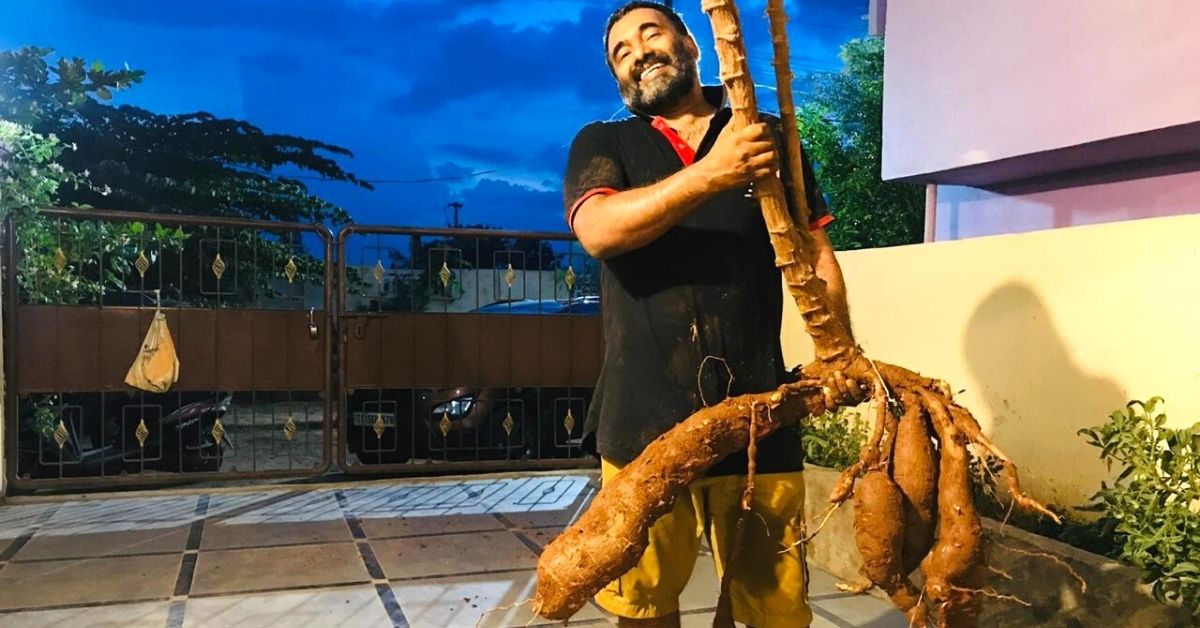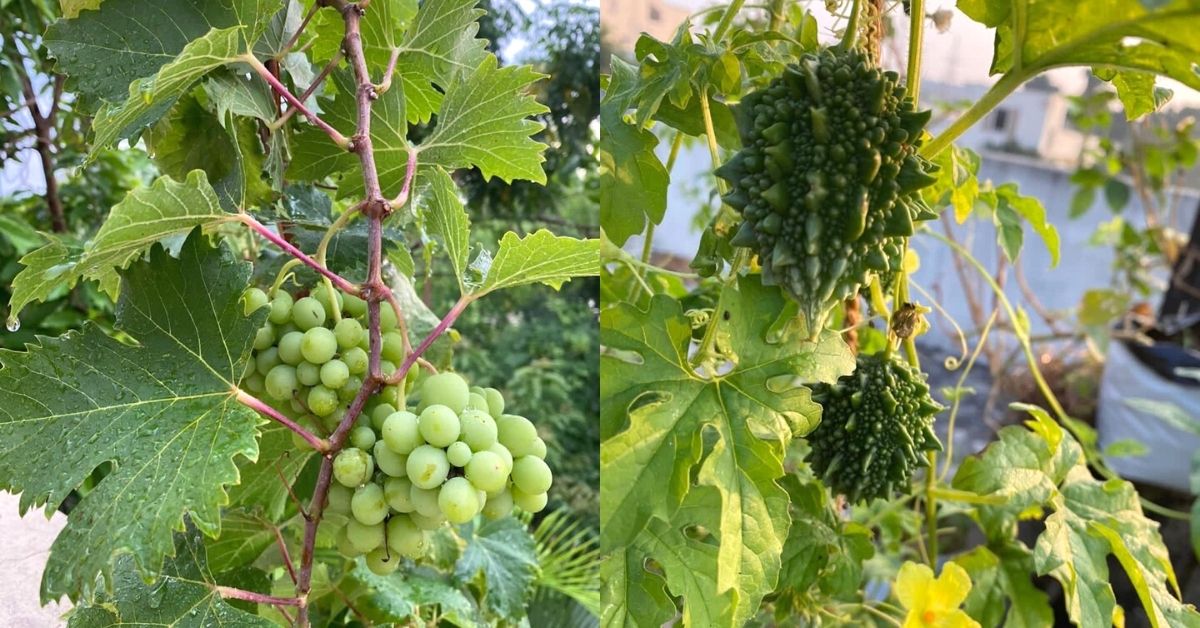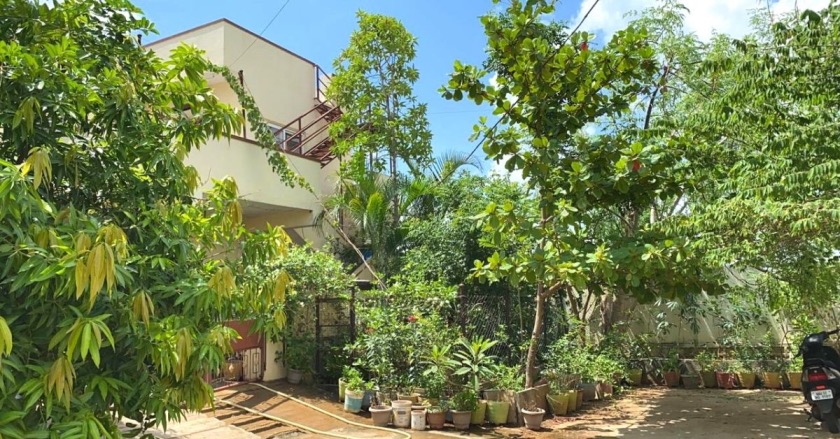IIT-H Professor Grows 24 Veggies in 200-Yard Terrace Garden, Gets Bumper Tapioca
A, native of Kerala, Deepak John Mathew moved to Hyderabad in 2014 and now grows cabbages, leafy vegetables, beans, among others on his terrace, which inspires his colleagues and students

In 2019, Deepak John Mathew, a professor at IIT-Hyderabad planted tapioca in his home garden. Eight months later, he got a bumper harvest of 24 kg tapioca, which was four times the estimated average yield of about 6 kgs.
But Deepak says that the surplus produce was all by accident.
A native of Kerala, Deepak, who is at the helm of the department of design, spends most of his day in the virtual world. A photographer and an artist, his routine revolves around young minds, teaching them aspects of virtual reality, artificial intelligence and making films.
But early in the morning and on holidays, he relaxes on a chair in his 200-yard terrace garden.
“Tapioca is natural and a staple in Kerala. I got some tapioca sticks from Thekkady to experiment with. All you have to do is push the sticks inside the soil and water the plant. I was surprised to see a huge root growing in my garden,” says the 50-year-old, adding that the plant was organically grown.
Two dozen vegetables in grow bags

Besides tapioca, the professor-farmer has about two dozen vegetables growing in his terrace garden. “Some vegetables are seasonal while others grow throughout the year. I use grow bags (durable and reusable, pot-like structures) and coco peat with soil mixed with organic compost for my plants. This makes the soil light and becomes easy to lift from ground to the terrace,” Deepak says.
A walk around his terrace will bring you sights of cabbage patches, leafy vegetables, beans, gourds, bitter gourds, carrots, chillies, tomato and brinjal plants, among others, neatly placed in grow bags. A 20 kg rice bag, he says, is good enough for big plants.
Deepak says about 70% of his family’s vegetable needs are met with his terrace garden. There are also fruits like grapes and pomegranate growing in the compact space.
“We never get the pomegranates to eat as they are all consumed by squirrels,” laughs Deepak, adding, “Parrots and other birds eat half of the grapes and other fruits. But I let them eat, there is no harm in it.”
One with the birds and the bees

With such an abundance of food, snakes, worms, butterflies, honey bees, and other uninvited guests feel at home on Deepak’s terrace.
“I don’t spray insecticides or pesticides so that the birds and insects can eat my produce. You have to be careful with snakes, but 90% of the visitors are non-poisonous. And an occasional spray of neem oil takes care of small infections,” Deepak tells The Better India.
The professor says that his love for natural food and habit of growing his own produce has been his lifestyle since his childhood. “My family lived along the edges of Thekkady wildlife sanctuary. My grandfather and father always grew vegetables at home, and I grew up doing the same.,” Deepak says.
In 2014, the professor moved to Hyderabad to work at IIT and initially lived in an apartment. Soon he found a bigger house for himself and removed all the concrete pavement and flooring around his home to grow vegetables.
“It also helps the water percolate inside the ground. There was no water logging in my house during the floods and heavy rains. All the water seeped underground,” he adds.
Taking a cue from the professor, many of his students and his colleagues have started growing vegetables at home.

Sumana Som is one such PhD student that took inspiration from her guide.
“I know Deepak for the past four years and his love for farming. After showing interest in growing vegetables, the mentor shared saplings of okra, brinjals and betel leaf,” says Sumana.
The student adds that Deepak advised her to start small and she gave it a thought before deciding to go for it. “My husband is interested in growing flowers, and now we both have a mixed plantation that looks beautiful in our house,” Sumana adds.
“People feel that nothing grows on the terrace. But when the students and colleagues visit the house, they get surprised to see 50 cabbages. I distribute the surplus harvest among staff and students. That is how they get inspired to grow vegetables,” Deepak adds.
(Edited by Yoshita Rao)
If you found our stories insightful, informative, or even just enjoyable, we invite you to consider making a voluntary payment to support the work we do at The Better India. Your contribution helps us continue producing quality content that educates, inspires, and drives positive change.
Choose one of the payment options below for your contribution-
By paying for the stories you value, you directly contribute to sustaining our efforts focused on making a difference in the world. Together, let’s ensure that impactful stories continue to be told and shared, enriching lives and communities alike.
Thank you for your support. Here are some frequently asked questions you might find helpful to know why you are contributing?


This story made me
-
97
-
121
-
89
-
167











